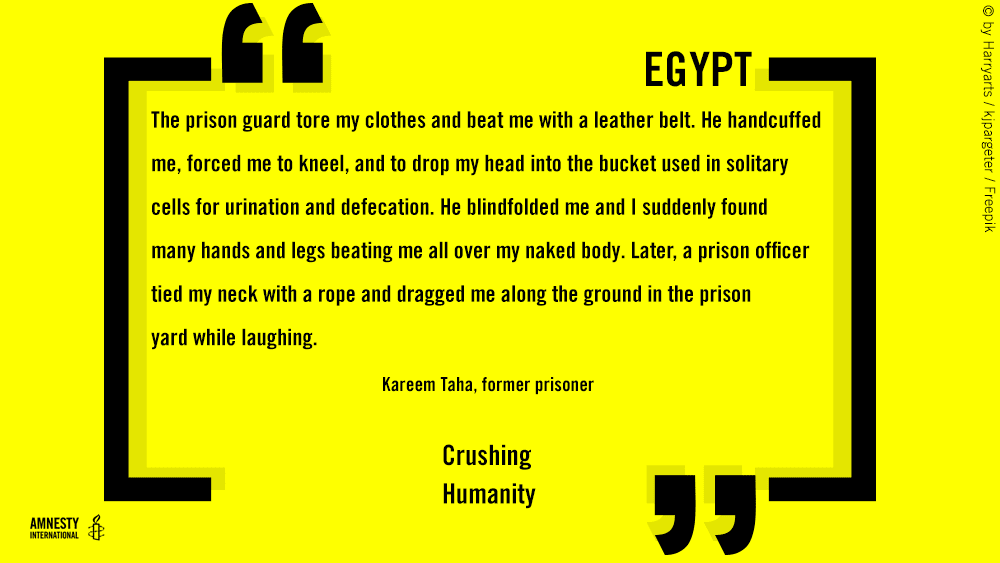“The first time I saw Hisham after his arrest was in hospital. He described his solitary cell to me. He could not see anything in the darkness of the cell. It was hard for him to breathe there was no window or source of air. He said it felt like being buried alive. When the prison guards finally moved him from the cell, it felt like being reborn. But after just a few months in the prison’s hospital, he was put back into solitary confinement again.” Said Manr el-Tantawie, Hisham Gaafar`s wife who has been held in solitary confinement in al-Aqrab Prison.
New research by Amnesty International reveals that prisoners detained on politically motivated charges are being held in prolonged and indefinite solitary confinement in Egypt – at times for several years – which in and of itself amounts to torture. They are locked in their cells for 24 hours for weeks at end, denied any human contact and kept in horrific cell conditions.
Crushing humanity: the abuse of solitary confinement in Egypt’s prisons reveals that dozens of detained human rights activists, journalists and members of the opposition held in solitary confinement are being targeted with horrendous physical abuse, including beatings by prison guards and having their heads repeatedly dunked into a container contaminated by human excrement. The intentional mental and physical suffering being inflicted on them, results in panic attacks, paranoia, hypersensitivity to stimuli, and difficulties with concentration and memory.
“Under international law, solitary confinement may only be used as a disciplinary measure of last resort, but the Egyptian authorities are using it as a horrifying ‘extra’ punishment for political prisoners – meted out in a ruthless and arbitrary manner designed to crush their humanity and eliminate their hope in any a better future,” said Najia Bounaim, North Africa Campaigns Director at Amnesty International.
“Prison conditions in Egypt have always been bad but the deliberate cruelty of this treatment shows the wider contempt for human rights and dignity by the Egyptian authorities.”
Amnesty International has documented 36 cases of prisoners being held in prolonged and indefinite solitary confinement six of them are unlawfully isolated from the outside world since 2013.
Former prisoners interviewed by the organization described being beaten by prison officials for extended periods, then being held in restricted spaces, alone, for weeks on end. Six prisoners have been held in solitary confinement for over four years.
Prisoners also receive insufficient food and water and inadequate sanitation and bedding. Former prisoners who spent a long time in solitary confinement told Amnesty International that such experience has had a fundamental effect on them psychologically. They suffer depression, insomnia and an unwillingness to socialise or speak to other people when released back into the prison population.
Those targeted also include members of a range of opposition political parties and movements, including the Muslim Brotherhood and the 6 April Youth Movement.
All documented cases followed a pattern of confinement for more than 22 hours a day, with between 30 minutes and an hour of exercise daily. Contact with other prisoners were not permitted, prisoners denied family visits on regular basis and one prisoner has not received a single visit since October 2016. Prisoners also were not told when their solitary confinement would end, leaving them with no hope of an end in sight.
Solitary confinement is at times used to discipline prisoners who complain of ill-treatment, as well as those caught sending letters communicating poor prison conditions.
In some cases, the practice has been employed to coerce confessions from those detained on trumped up charges. In most cases however, Amnesty International found that there are groups of prisoners held in solitary confinement indefinitely purely because of their past political activism.
“Egyptian prison officials are unlawfully applying solitary confinement as a means of stamping out dissent or any perceived misconduct from prisoners, many of whom have been imprisoned on spurious charges in the first place,” said Najia Bounaim.
“Not only are Egyptian human rights defenders, journalists and members of the opposition being targeted for peacefully expressing their views in the outside world; their persecution also continues behind bars.”
Amnesty International conducted 91 interviews with nine former prisoners and with the family members of 27 individuals who are still imprisoned. The interviews were carried out between March 2017 and April 2018.
Due to the seriousness of the findings, Amnesty International submitted a memorandum containing a summary of this research to the Egyptian authorities on 16 April. No response has been received.
“The utter indifference shown for the psychological suffering prolonged and indefinite solitary confinement inflicts on human beings already being punished with imprisonment, often just for their political beliefs, is a demonstration of the brutality that permeates many Egyptian institutions today,” said Najia Bounaim.
Since the replacement of former President Mohamed Morsi on 3 July 2013 by President Abdelfattah al-Sisi, who is now serving a second term, the Egyptian authorities have rounded up tens of thousands of individuals on politically motivated charges.
Background
Solitary confinement is a common practice in all Egyptian prisons. However, Amnesty International focused this report on the experiences of prisoners detained for political reasons because research showed that solitary confinement for these types of prisoners was more likely to be prolonged and indefinite.
14 prisons in seven different governorates in Egypt were examined in this report including Liman Tora Prison, Tora Investigation Prison, Tora Maximum Security Prison 1 (more commonly known as al-Aqrab, or the Scorpion Prison). 20 prisoners of the 36 documented in the report have been held in prolonged solitary confinement in Tora Complex Prisons.
These prisons are located in governorates where security forces have arrested and detained thousands of individuals on politically motivated charges.

